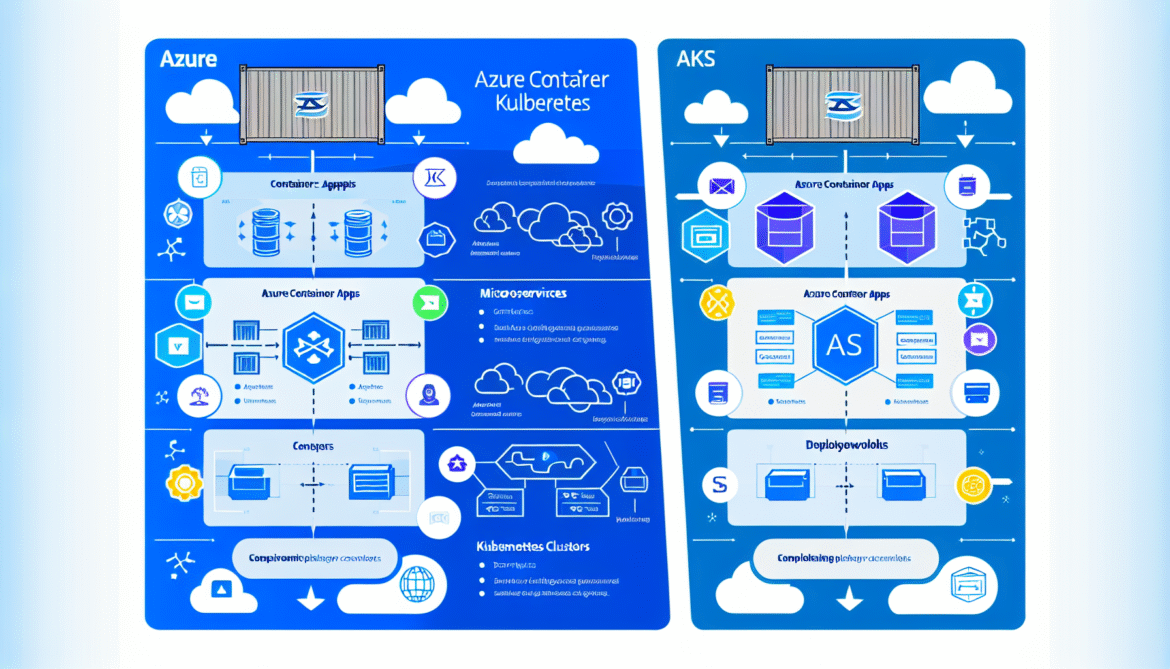As containerization continues to dominate cloud-native development, Microsoft Azure offers two robust platforms for container deployment: Azure Container Apps (ACA) and Azure Kubernetes Service (AKS). In 2025, choosing between these platforms has become a crucial decision for organizations. Let’s dive deep into both services to help you make the right choice.
1. Overview of Both Platforms
Azure Container Apps (ACA)
Azure Container Apps is a serverless container platform that allows you to run microservices and containerized applications on a fully managed environment. It’s built on top of Kubernetes but abstracts away the complexity of direct cluster management.
Azure Kubernetes Service (AKS)
AKS is a managed Kubernetes service that handles critical tasks like health monitoring and maintenance while giving you complete control over cluster configuration and operations.
2. Key Comparison Factors
| Feature | Azure Container Apps | AKS |
|---|---|---|
| Management Overhead | Minimal | Moderate to High |
| Control | Limited | Full |
| Scaling | HTTP/Event-driven auto-scaling | Custom-defined auto-scaling |
| Learning Curve | Low | High |
| Cost Model | Pay-per-use | Pay for node infrastructure |
3. When to Choose Azure Container Apps
Choose Azure Container Apps when:
- Building microservices that need HTTP and event-driven auto-scaling
- You want to focus on application code rather than infrastructure
- Your team has limited Kubernetes expertise
- You need quick deployments with minimal configuration
- Your workloads are suitable for serverless scaling
# Example: Deploy to Azure Container Apps using Azure CLI
az containerapp create \
--name my-container-app \
--resource-group my-resource-group \
--environment my-environment \
--image mcr.microsoft.com/azuredocs/containerapps-helloworld:latest \
--target-port 80 \
--ingress external \
--min-replicas 0 \
--max-replicas 104. When to Choose AKS
Choose AKS when:
- You need complete control over your Kubernetes infrastructure
- Your application requires complex networking or storage configurations
- You’re running stateful applications requiring persistent volumes
- You need to implement custom scheduling rules
- Your organization has existing Kubernetes expertise
# Example: Create an AKS cluster
az aks create \
--resource-group my-resource-group \
--name my-aks-cluster \
--node-count 3 \
--enable-addons monitoring \
--generate-ssh-keys5. Cost Considerations (2025 Pricing Model)
Azure Container Apps
- Pay only for resource consumption (CPU, memory, requests)
- Zero cost when no containers are running
- Built-in auto-scaling can help optimize costs
AKS
- Pay for underlying VM infrastructure
- Additional costs for persistent storage
- Requires careful capacity planning
6. Integration Capabilities
Both platforms offer robust integration with Azure services, but there are some differences:
| Integration | Azure Container Apps | AKS |
|---|---|---|
| Azure Monitor | Built-in | Requires configuration |
| DAPR | Native support | Manual setup required |
| Service Mesh | Limited options | Multiple options |
| Custom Networks | Basic options | Advanced options |
7. Real-World Scenarios
Scenario 1: Microservices Application
Choose Container Apps if:
- Services are stateless
- HTTP/event-driven scaling is needed
- Quick deployment and minimal management are priorities
Choose AKS if:
- Services require complex orchestration
- Custom network policies are needed
- You need fine-grained control over scaling
Scenario 2: Enterprise Application
Choose Container Apps if:
- Application consists of independent, scalable components
- Built-in authentication and SSL management are sufficient
Choose AKS if:
- Complex security requirements exist
- Application requires specialized storage solutions
- Multi-region deployment with custom traffic routing is needed
8. Migration Considerations
When migrating existing applications:
- Container Apps provides easier migration for simple containerized applications
- AKS is better suited for existing Kubernetes workloads
- Consider using Azure Migrate for assessment
Conclusion
In 2025, both Azure Container Apps and AKS serve distinct purposes in the container ecosystem. Choose Azure Container Apps for simplified, serverless container deployment with automatic scaling. Opt for AKS when you need full control over your container infrastructure or have complex orchestration requirements.
Remember that these platforms aren’t mutually exclusive – many organizations use both, selecting the right tool for each specific workload. The key is understanding your application’s requirements, team expertise, and operational needs when making the decision.
As Azure continues to evolve, both platforms are receiving regular updates and improvements. Stay informed about the latest features and capabilities to make the most of your chosen platform.







